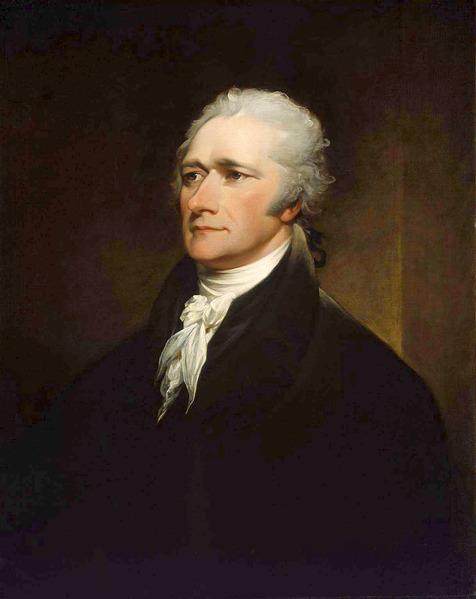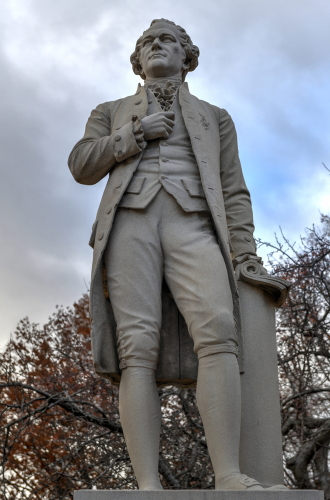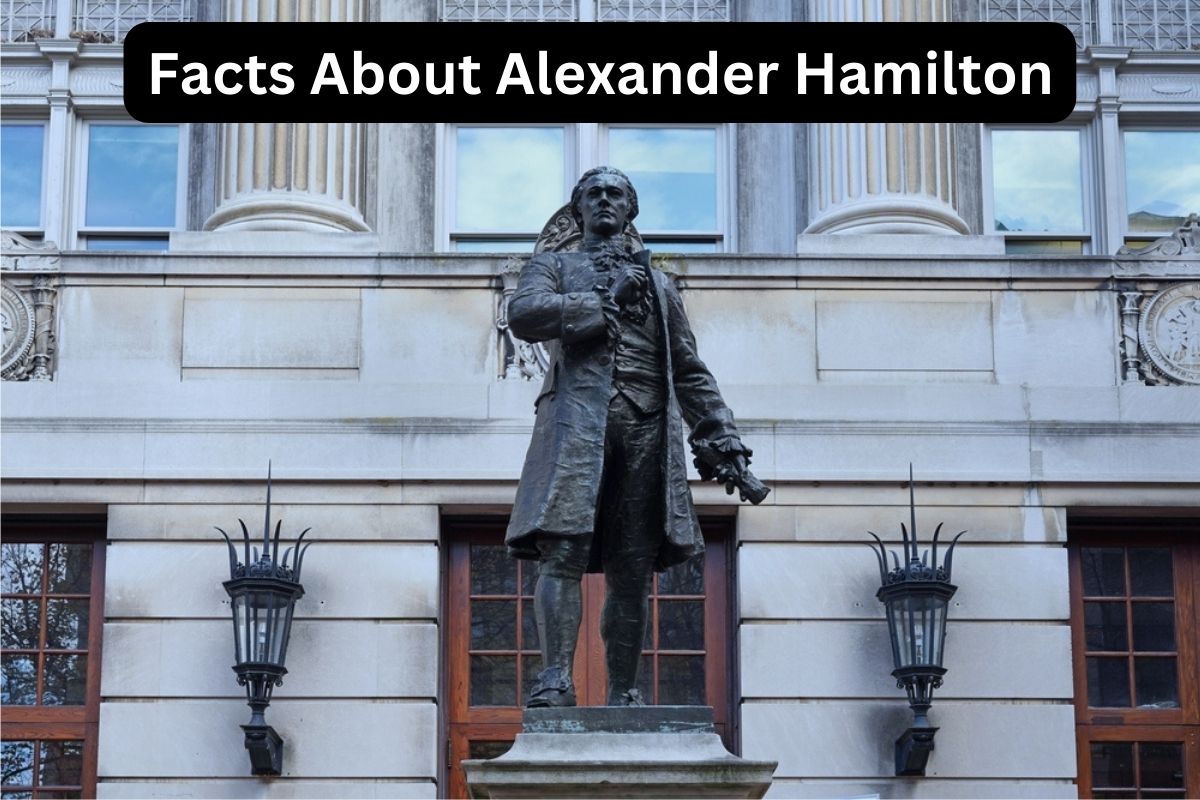Alexander Hamilton (1755/1757-1804) was a prominent figure in American history, known for his contributions as a Founding Father, military leader, and the first Secretary of the Treasury of the United States.
Born in the British West Indies, Hamilton moved to the American colonies to pursue his education and quickly became involved in the revolutionary cause. He played a vital role in shaping the United States Constitution, co-authoring “The Federalist Papers” to promote its ratification.
As Secretary of the Treasury, Hamilton established the nation’s financial system and advocated for a strong central government. His life was tragically cut short in a duel with Aaron Burr, leaving behind a significant legacy that continues to shape American politics and economics.
Alexander Hamilton Facts
1. Alexander Hamilton was born on January 11, 1755 in Charlestown, Nevis, in the British West Indies
Alexander Hamilton was born on January 11, 1755 (or possibly 1757) in Charlestown, Nevis, in the British West Indies. His exact birth year is uncertain because there are conflicting records.

2. Hamilton’s parents were James Hamilton, a Scottish trader, and Rachel Faucette Lavien, who was of French Huguenot descent
His parents were James Hamilton, a Scottish trader, and Rachel Faucette Lavien, who was of French Huguenot descent. Hamilton was born out of wedlock, which was a significant issue in the 18th century and caused him some social challenges throughout his life.
Also Read: Alexander Hamilton Accomplishments
Hamilton’s childhood was marked by financial struggles and personal tragedy. His father abandoned the family when Alexander was young, leaving his mother to raise him and his brother.
Tragically, his mother died of yellow fever in 1768, leaving Hamilton orphaned at the age of 13. This difficult start in life helped shape his determination and drive to succeed.
3. Hamilton moved to New York City in 1772 to pursue his education
After his mother’s death, Hamilton moved to St. Croix, where he became an apprentice at a local import-export firm. He showed exceptional intelligence and a knack for accounting.
Recognizing his talents, local businessmen raised funds to send Hamilton to the mainland American colonies for education. In 1772, he arrived in New York City to pursue his studies at King’s College (now Columbia University).
Also Read: Alexander Hamilton Timeline
It was during his time at college that he became involved in the revolutionary ideas and political debates that would shape the rest of his life.
Hamilton’s early exposure to the challenges of poverty and his exposure to the intellectual climate of New York City helped shape his strong convictions and passion for social and political change.
4. During the American Revolutionary War, Hamilton served as an artillery captain in the Continental Army
During the American Revolutionary War, Alexander Hamilton served as an artillery captain in the Continental Army. His strategic brilliance and leadership skills caught the attention of General George Washington, who appointed Hamilton as his aide-de-camp.
Hamilton developed a close and trusted relationship with Washington, serving as his advisor and confidant throughout the war. He participated in several key battles, including the Battle of Yorktown, where British General Cornwallis surrendered, effectively ending the war.

5. Hamilton played a crucial role in the development of the United States Constitution
Following the Revolutionary War, Hamilton played a vital role in shaping the United States Constitution. Alongside James Madison and John Jay, he co-authored “The Federalist Papers,” a collection of essays published in newspapers to promote the ratification of the Constitution.
These essays outlined the principles and benefits of a strong central government, addressing concerns and countering arguments made by opponents of the Constitution.
Hamilton’s contributions to “The Federalist Papers,” particularly his essays on economics and finance (now known as the “Federalist No. 9,” “Federalist No. 11,” and “Federalist No. 23”), highlighted his expertise in financial matters and solidified his reputation as a leading political thinker of his time.
6. Hamilton was a strong advocate for a strong central government and played a key role in the formation of the United States’ financial system
As the first Secretary of the Treasury under President George Washington, Hamilton established and implemented numerous policies that laid the foundation for the United States’ financial system. He advocated for a strong central government and sought to establish the economic stability and credibility of the young nation.
Hamilton proposed the creation of a national bank, the First Bank of the United States, to manage the country’s finances and stabilize the economy. He also introduced a system of tariffs and taxation to generate revenue for the federal government and reduce the national debt.
These policies helped establish the United States’ creditworthiness, encouraged economic growth, and fostered the development of a modern financial system.

7. Hamilton was involved in a famous political rivalry with Thomas Jefferson
Alexander Hamilton’s political ideology often clashed with that of Thomas Jefferson, one of the leading figures of the opposition Democratic-Republican Party. Hamilton and Jefferson held divergent visions for the future of the United States.
Hamilton believed in a strong central government, industrialization, and a robust financial system to support the country’s growth. He advocated for a loose interpretation of the Constitution, empowering the federal government to take on broad powers.
In contrast, Jefferson championed agrarianism, states’ rights, and strict adherence to the Constitution’s limited interpretation. Their differences led to a significant political rivalry and ideological debates that shaped the early political landscape of the United States.
8. In 1804, Hamilton’s political career was cut short when he was killed in a duel with Aaron Burr
In a tragic turn of events, Alexander Hamilton’s political career was cut short when he was involved in a duel with Aaron Burr, the Vice President of the United States at the time. The duel took place on July 11, 1804, in Weehawken, New Jersey.
The dispute between Hamilton and Burr had been fueled by longstanding personal and political animosity. Hamilton, who had publicly criticized Burr’s character and political ambitions, agreed to the duel to defend his honor.
Tragically, he was mortally wounded, succumbing to his injuries the following day, July 12, 1804. The duel with Burr marked the end of a remarkable life and a significant loss for the young nation.
9. Hamilton’s face is currently featured on the U.S. $10 bill
Alexander Hamilton’s contributions to the United States are commemorated by his presence on the U.S. $10 bill. His face has been featured on the bill since 1929, making him one of the few non-presidents to be depicted on U.S. currency.
This recognition underscores the importance of Hamilton’s financial policies and his role in shaping the economic foundation of the country.
10. Hamilton was a staunch abolitionist and founded the New York Manumission Society in 1785
Hamilton was a staunch abolitionist and an advocate for the rights of free African Americans. In 1785, he co-founded the New York Manumission Society, an organization dedicated to promoting the gradual abolition of slavery in New York State and protecting the rights of free black people.
Hamilton and the society worked to pass legislation that would end slavery, support freed slaves, and challenge the institution’s moral and economic foundations.
Although Hamilton himself never owned slaves, his active involvement in the abolitionist movement reflected his commitment to justice and equality.
11. Hamilton was also a proponent of a strong military and was instrumental in establishing the United States Military Academy at West Point, New York
Hamilton’s vision extended beyond finance and politics; he recognized the importance of a strong military for the young nation’s security. In 1794, as Secretary of the Treasury, Hamilton played a crucial role in establishing the United States Military Academy at West Point, New York.
He pushed for the creation of a military academy to ensure the professional training of officers and strengthen the nation’s defense capabilities. Today, West Point remains one of the premier military institutions in the United States.
12. Hamilton was an influential writer and orator
Besides his political endeavors, Alexander Hamilton was renowned for his exceptional writing and oratory skills. He possessed a powerful and persuasive speaking style that captivated audiences.
Hamilton’s talent for public speaking and his ability to articulate complex ideas helped him advocate for his policies and shape public opinion. He wrote many of George Washington’s speeches and was recognized as one of the most eloquent voices of the Founding Era.
13. Hamilton’s life and legacy have been popularized in recent years by Lin-Manuel Miranda’s hit musical “Hamilton”
In recent years, Alexander Hamilton’s life and legacy have enjoyed a resurgence of popularity, largely due to Lin-Manuel Miranda’s hit musical, “Hamilton.” The Broadway musical, which premiered in 2015, tells the story of Hamilton’s life using a blend of hip-hop, R&B, and other musical styles.
The production garnered critical acclaim, won numerous awards, and captured the public’s imagination with its innovative approach to storytelling and its exploration of Hamilton’s accomplishments and personal struggles.
The musical’s success has sparked renewed interest in Hamilton’s contributions to American history, attracting a wide and diverse audience to learn about his influential role in shaping the nation.
